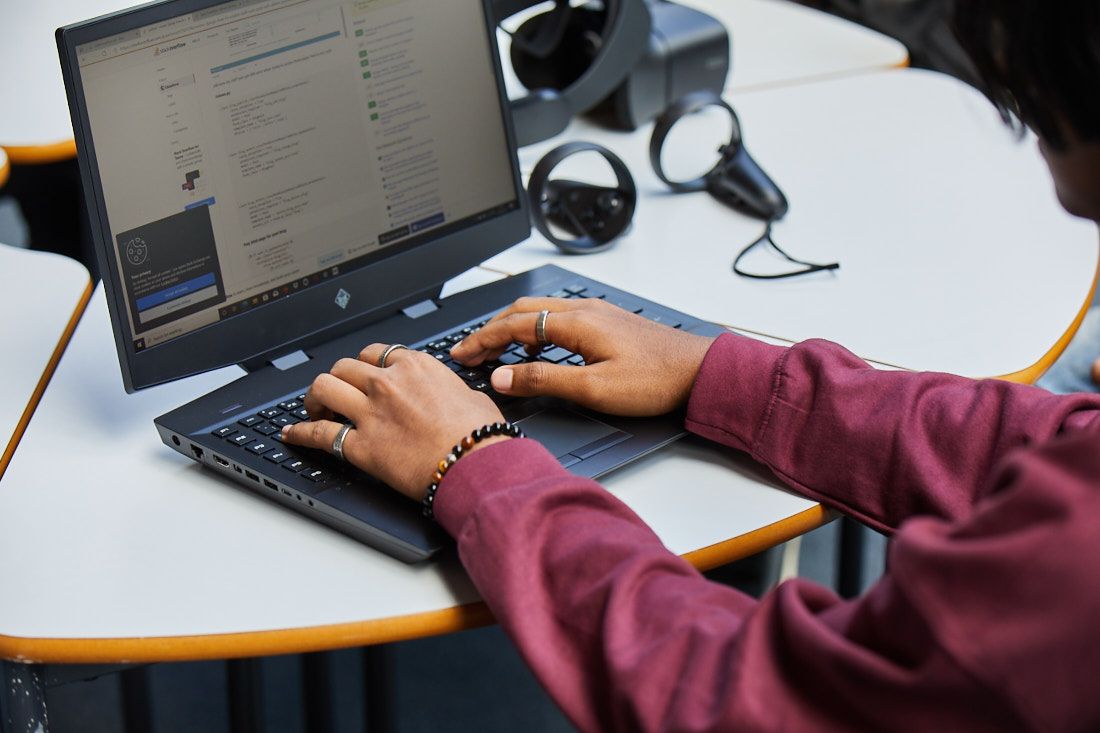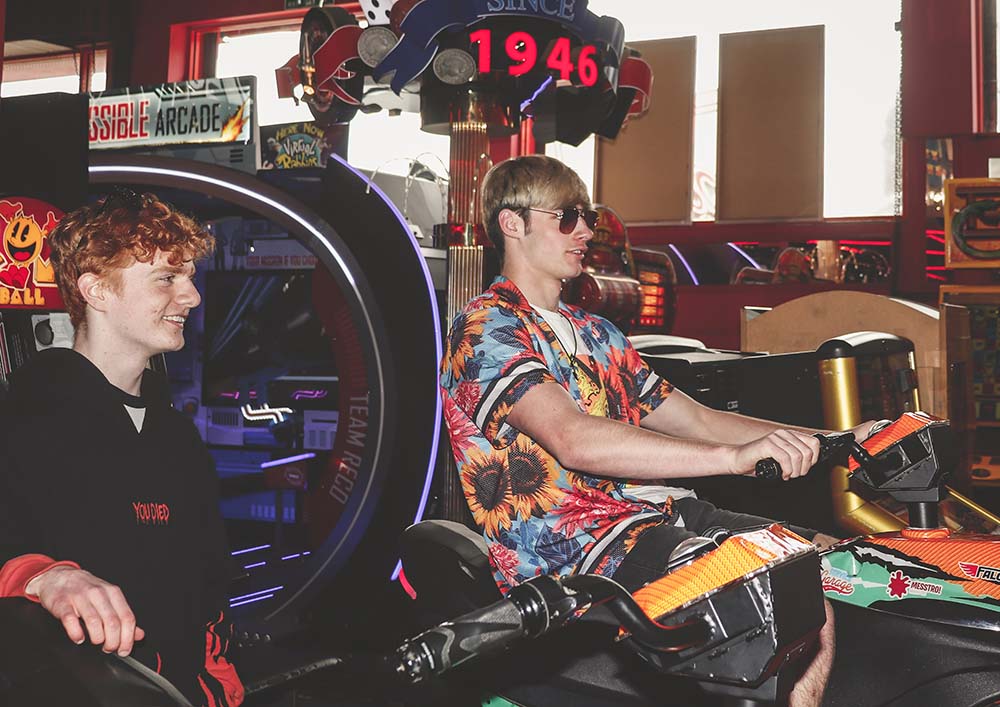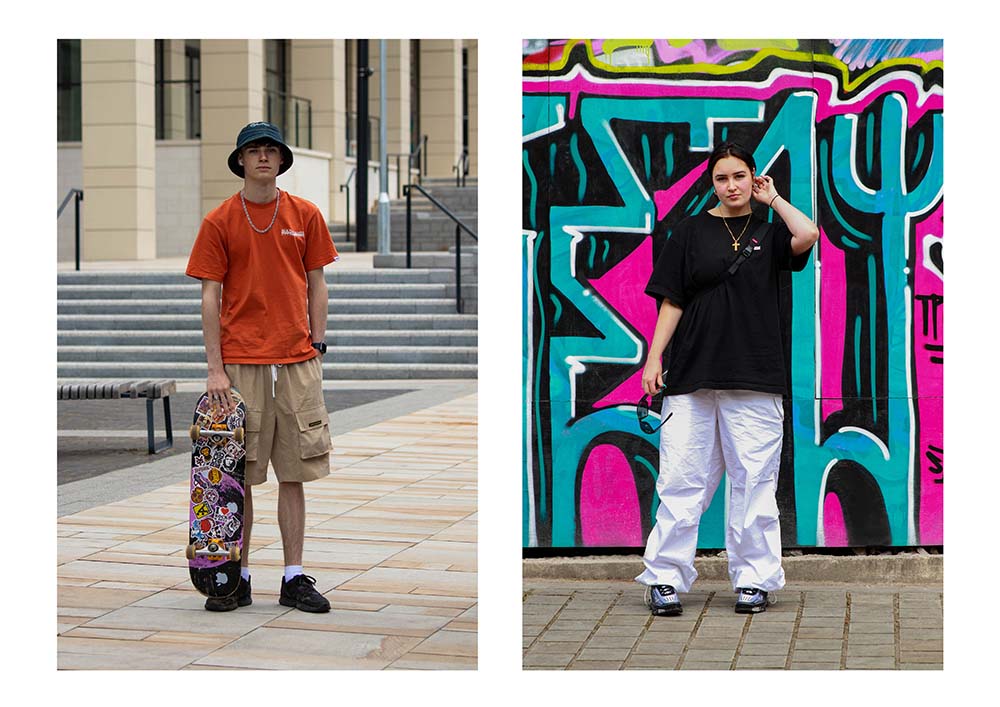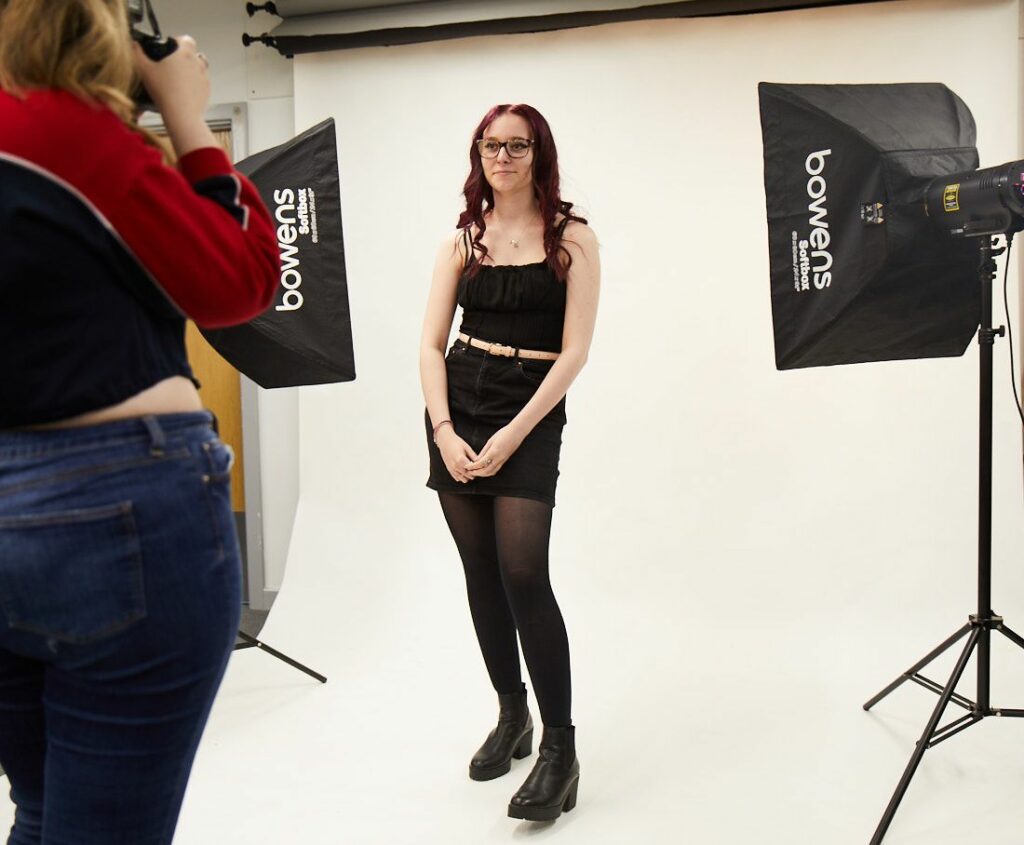LCC PHOTOGRAPHY WCAG 2.1AA TRANSCRIPT
SCHOOL OF CREATIVE ARTS , LEEDS CITY COLLEGE TRANSCRIPT
INTERVIEWEE – TYLER – Student of Level 3 Photography (SPEAKING)
INTERVIEWEE – LEON JOHNSON – Deputy Head of Department, Visual Arts (SPEAKING)
INTERVIEWEE – MAX – Student of Level 2 Photography (SPEAKING)
INTERVIEWEE – CIENNA – Student of Level 2 Photography (SPEAKING)
Scenery – A student slots the camera lens into the camera.
Scenery – A student lifts a camera up to their face and prepares to take a picture.
Tyler – “Well I’ve had a photographic background with my mum because she used to be a wedding photographer and stuff”
Scenery – A makeup brush presses down on some powder.
Scenery – A makeup artist applies the powder to a student’s face.
Tyler – “But that’s not the road I wanted to go down as I don’t really like photographing people. I’m more into structures and urban-scapes. So I thought if I came into college and studied then I can go off and do what I want to focus on”.
Scenery – Tyler flicks through a film book.
Scenery – A pan through a dark room, showing the equipment in each cubicle.
Tyler – “Like anything that’s run-down or overlooked by everyone else I like taking pictures of that cause it shows the hidden beauty that everyone ignores.”
Scenery – Tyler holds up a piece of film while in the dark room.
Tyler – “Obviously you walk past stuff and living in britain is quite grey so everything just looks dull and boring but when you put a camera to it you can take pictures of these places and you see it there and can do all the edit to make it look brighter, it’s almost like a relief that we don’t actually live in such a grey world that we make out. Because there’s a lot of hidden beauty in these places but people just don’t see it”.
Scenery – A makeup artist continues to work on the students face
Leon Johnson – “We look for kids that are passionate about being artistic I suppose. With photography there’s two different ways you could look at this. You have quite a lot of students who come in with a technical mindset where they just want to understand and know how to do technical photography so they can get a job photographing weddings and jobs, that kinda thing”.
Scenery – Student readies camera and takes a picture
Leon Johnson – “What they realise when they get here is actually that’s not necessarily the only important thing because when they’re photographing a wedding what you need is love and passion. That’s what will be seen and that’s what will be captured when students look at a scene and don’t look at it from a technical aspect but from a social aspect as well”.
Scenery – Students set up a softbox.
Cienna – “It was in high school when I got an option to do photography and I was like I’ll just try it out and I did and I ended up liking it alot, editing, sticking, doing the physical and practical on the computers, I got to learn all about photography there and I wanted to do it in college”.
Scenery – Students are using Mac’s to edit their photos
Cienna – “My favourite thing about photography is the practical side of it, doing shoots, going out, using the cameras and camera control. Stuff like that”.
Scenery – Student readies camera and takes a photo of a student model.
Max – “First thing I thought of photography, I thought I want to get my own pictures of photography one day because I like taking profile pictures. Within that section I discovered something called image manipulation and that’s like an image on top of another and it creates like… it’s like a piece of art”.
Leon Johnson – “The photography teaching team is a fantastic kind of new young team and they’re all experienced in the industry. First off teaching is something they’ve come into to I suppose share their passion within the industry and getting our young people to understand how photography fits in to our society”
Scenery – Student readies camera and model poses as the softboxes light up
Max – “Well for me, cause I’ve got autism and I sometimes have trouble understanding things cause I need stuff breaking down into detail and explaining to me in a perfect way. In a much more understanding way. I have tutors that understand a bit more”.
Scenery – Darkroom equipment is shown off.
Leon Johnson – “We have a darkroom, so we go right back to the beginning of photography. It’s not just about the way photography is done nowadays in digital formats. We go back to the beginning so they understand the process”.
Scenery – A live demonstration of the darkroom’s equipment
Leon Johnson – “So they get to do traditional techniques, which then follows on to the idea of digital techniques and digital photography which leads naturally onto post production. So the sort of facilities we have are like computer rooms, mac suites where you can use photoshop and indesign”.
Scenery – Students are seen on photoshop touching up images
Leon Johnson – “So photoshop for example for retouching or slightly adapting colours or lighting where it needs to be adapted but then also with programs like indesign it means that students can start to understand the context of how photographs work with text”.
Scenery – Students get a set ready. Placing a stool and raising softboxes.
Leon Johnson – “We’ve got state of the art studios where we have high quality softboxes, high quality cameras, tripods & lighting rigs all of the kind of things that students would need in a professional setting and it gives them the tools to understand how a photography studio would work if they got a job going on from getting a qualification”.
Scenery – Tyler demonstrates the darkroom process.
Tyler – “Well, when you’ve got a digital camera you click it and it’s just done. Like you’ve not really had to put much effort into it. But when it comes to the darkroom sides of things you have to fiddle around with aperture and everything so you have to make sure everything’s right and then take the picture. But then you’re left in a suspense of whether your picture turned out the way you wanted it or not. When it does turn out the way you want it it’s a good feeling when you know you’ve got that picture.
Scenery – Tyler places the developed photo on a wall.
Leon Johnson – “We have a photography dispensary as well where we have all the equipment that’s necessary for students to work professionally. You know realistically if you think about communication which is one of the main criteria or the big skills that students learn at college doing these art courses or photography courses is that photography is a global language. It doesn’t matter if you speak Japanese or Iranian or if you’re muslim or christian. Photography transcends those language barriers and I think that it’s really exciting for students to go into a future of being able to communicate in that way”.
End Slide – Leeds City College (School of Creative Arts)
END






Follow us on Social Media